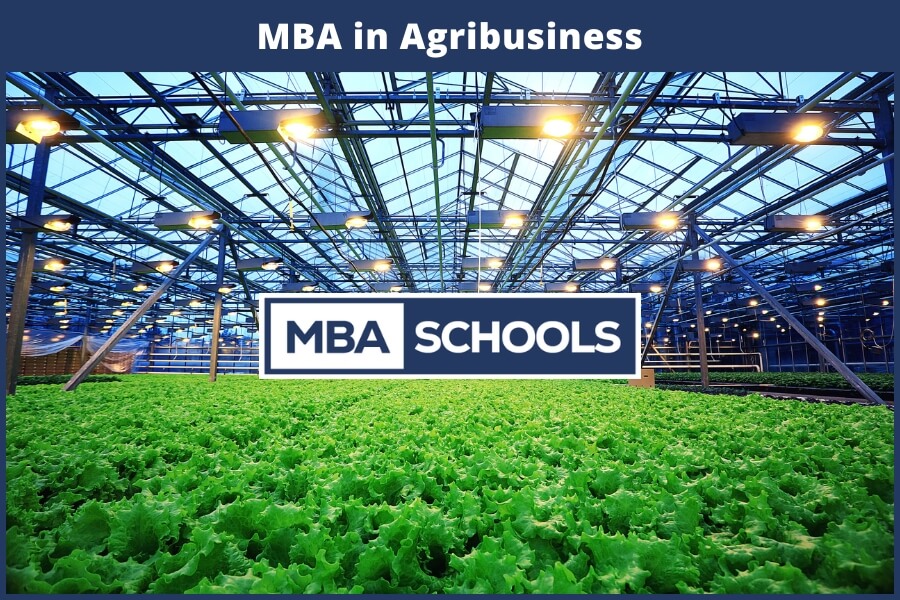MBA in Agribusiness
An MBA in Agribusiness is designed for professionals looking to lead agricultural enterprises, food production companies, and global supply chains. This specialization focuses on agribusiness finance, sustainable farming, food supply management, and agricultural technology, equipping graduates with the expertise to manage agribusiness operations, commodity trading, and farm-to-market logistics.
According to the U.S. Department of Agriculture (USDA), the agribusiness industry contributes over $1 trillion to the U.S. economy annually, with employment in food production, agricultural logistics, and supply chain management continuing to expand. Additionally, the median salary for agribusiness managers is $120,000, reflecting the growing demand for leaders who can optimize farm production, manage agritech innovations, and navigate global food markets (USDA). A report by McKinsey & Company highlights that precision agriculture and sustainable farming initiatives are expected to increase food system efficiency by 30% in the next decade, making agribusiness management a key area for economic growth (McKinsey).
An MBA in Agribusiness specialization is ideal for professionals seeking to lead agricultural enterprises, develop food security strategies, and manage the intersection of business and sustainable farming.
Find out more about MBA degrees.

Table of Contents
What is an Online MBA in Agribusiness?
An Online MBA in Agribusiness provides a flexible pathway for professionals looking to develop expertise in agricultural finance, supply chain efficiency, and food industry regulations while continuing their careers. These programs focus on agribusiness operations, food sustainability, and commodity markets, helping students prepare for leadership roles in agribusiness firms, food distribution networks, and global trade organizations.
Students gain expertise in farm management, agricultural policy, and resource optimization, ensuring they are equipped to improve agricultural production, maximize profitability, and support sustainable food systems. Many online programs include real-world agribusiness case studies, supply chain simulations, and rural development projects, providing an immersive learning experience.
What Are the Admissions Requirements for an MBA in Agribusiness?
Admissions requirements for an MBA in Agribusiness vary by program, but typically include:
- Accredited Bachelor’s Degree – Often in business (such as a BBA degree), agriculture, environmental science, or a related field.
- Work Experience – 2-5 years of professional experience in agriculture, supply chain management, or agribusiness is preferred.
- GMAT/GRE Scores – Some programs require standardized test scores, while others offer waivers.
- Personal Statement – Discussing career goals and why the applicant is pursuing an MBA in Agribusiness.
- Letters of Recommendation – Typically from employers, agricultural executives, or academic mentors.
- Resume – Highlighting experience in food production, agritech, or agricultural business management.
Is an MBA in Agribusiness the Right Specialization for You?
An MBA in Agribusiness specialization is best suited for professionals who are strategic thinkers, sustainability-driven, and interested in agricultural market trends. If you are passionate about agribusiness innovation, food security, and supply chain efficiency, this specialization will provide the necessary skills for career advancement.
Compared to other MBA specializations, such as Supply Chain Management or Sustainability, an MBA in Agribusiness focuses on agricultural production, commodity trading, and food industry policies. If you want to lead agricultural enterprises, optimize food supply chains, or develop sustainable farming practices, this program may be the best fit for you.
MBA in Agribusiness Curriculum: What Classes Will I Take?
Most MBA in Agribusiness programs take 1-2 years to complete, depending on whether students enroll full-time, part-time, or in an accelerated format.
Core Courses in an MBA in Agribusiness
The curriculum for an Agribusiness MBA specialization blends business strategy with agricultural industry expertise through courses such as:
- Agricultural Economics & Global Markets
- Food Supply Chain & Logistics Management
- Sustainable Farming & Agribusiness Innovations
- Commodity Trading & Risk Management
- Agritech & Precision Agriculture
- Rural Development & Agricultural Policy
- Financial Management in Agribusiness
- Global Food Security & Environmental Sustainability
Many programs also incorporate agribusiness consulting projects, including real-world supply chain optimization strategies, commodity market analysis, and sustainable farming initiatives. Some students complete internships with food production companies, agribusiness firms, or government agencies to gain hands-on experience before graduation.
What Career Options Do I Have with an MBA in Agribusiness?
An Agribusiness MBA specialization prepares graduates for leadership roles in food production, agricultural sustainability, and global commodity trading. Common job titles include:
- Agribusiness Manager – Oversees farm operations, supply chain logistics, and business development strategies.
- Sustainable Agriculture Consultant – Advises organizations on environmental farming practices and sustainable food production.
- Food Supply Chain Director – Manages distribution networks and optimizes farm-to-market supply chains.
- Commodity Trader – Analyzes and trades agricultural commodities, managing market risks and investment strategies.
- Rural Development Strategist – Works on government and nonprofit initiatives to improve agricultural communities.
Salary Expectations
Salaries for MBA in Agribusiness graduates vary based on industry, experience, and expertise. According to USDA and McKinsey, agribusiness professionals with an MBA typically earn:
- Agribusiness Manager – $110,000 – $160,000
- Sustainable Agriculture Consultant – $100,000 – $150,000
- Food Supply Chain Director – $120,000 – $180,000
- Commodity Trader – $130,000 – $190,000
- Rural Development Strategist – $90,000 – $140,000
Take the Next Step Toward a Leadership Role in Agribusiness
An MBA in Agribusiness provides the expertise needed to optimize food supply chains, develop sustainable agricultural strategies, and drive innovation in agritech. Whether you want to manage global agribusiness firms, trade commodities, or advance sustainable farming, this degree will give you the knowledge, skills, and network to achieve your career goals.
Explore top-ranked MBA in Agribusiness programs today and start advancing your career.
Sources
- U.S. Department of Agriculture. (2023). Agricultural Economy & Market Trends Report. Retrieved from https://www.usda.gov/
- McKinsey & Company. (2023). The Future of Agribusiness & Sustainable Food Production. Retrieved from https://www.mckinsey.com/